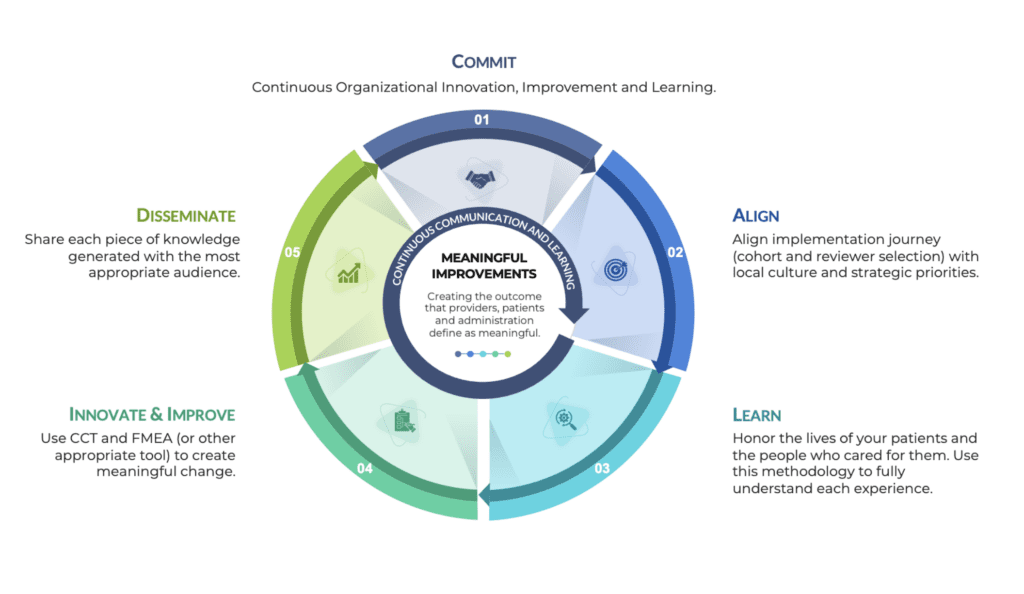Save More Lives with a Process That Works
Traditional healthcare review methods miss 80% of improvement opportunities. Our proven framework uncovers hidden system vulnerabilities and empowers your team to create lasting change.
A Proven Framework Born From Experience
Developed by a multidisciplinary team at Mayo Clinic and refined across 100+ hospitals, our COI2L™ (Continuous Organizational Innovation, Improvement, and Learning) framework transforms how healthcare organizations identify and solve system failures. We guide you through meaningful change that empowers your frontline staff and saves lives.
Your Journey to Transformational Change

Step 1: Commit to Transform
We help you build the foundation for lasting change by aligning your organization around a shared mission. Like you, we understand that every statistic represents someone’s loved one. That’s why we prioritize Continuous Organizational Innovation, Improvement, and Learning—so that change isn’t just a one-time initiative, but a sustainable process.
- Define clear goals that resonate with your teams
- Establish leadership support and strategic alignment
- Create psychological safety for an honest evaluation
Step 2: Prepare & Align Your Organization
Drawing from experience across leading healthcare institutions, we help you assemble and prepare the right teams to drive meaningful improvement.
- Align to organizational strategic and operational plans
- Select patient cohorts that matter most to your organization
- Build multi-disciplinary teams that break down silos
Step 3: Learn Through Our Safety Learning System®
Honor the lives of your patients—and the people who cared for them. Our systematic approach, developed over 14 years at Mayo Clinic, helps you fully understand each experience so you can create meaningful, lasting change.
- Perform case reviews and hold consensus meetings to transform insights into actionable improvements
- Uncover system vulnerabilities through expert clinical case reviews
- Foster collaborative learning across departments and disciplines
Step 4: Innovate & Improve Patient Care
We guide you in turning insights into targeted solutions that make a real difference in patient outcomes using CCT and FMEA (or other appropriate tool).
- Identify patterns that traditional reviews miss
- Design practical solutions that work in the real world
- Implement changes that stick
Step 5: Disseminate Knowledge
Create lasting cultural change by sharing insights effectively throughout your organization.
- Celebrate improvements and wins
- Build bridges between departments
- Foster continuous learning
Powered By Technology That Serves Your Mission

A powerful methodology requires software that can keep up. Healthcare Safeware® was built by clinicians who understand your daily challenges, turning our proven process into actionable workflows that drive real change. Our secure platform guides teams through every step while meeting the highest security standards.
- Intuitive workflows that respect clinical time
- Real-time collaboration tools that break down silos
- Analytics that tell the story behind the numbers
- FedRAMP-authorized IT security you can trust
Expert Partners Every Step of the Way
Transforming healthcare safety isn’t a one-time event—it’s an ongoing journey of discovery and improvement. Through regular collaborative sessions, leadership meetings, and just-in-time coaching, we ensure your teams have the support they need when needed. You gain more than a process; you join a community of healthcare leaders dedicated to saving lives.
Ready to Create Lasting Change in Your Healthcare Organization?
Join a community of healthcare leaders committed to making healthcare safer for everyone
